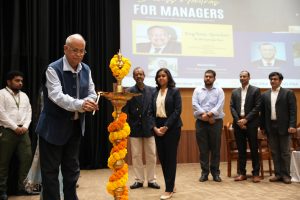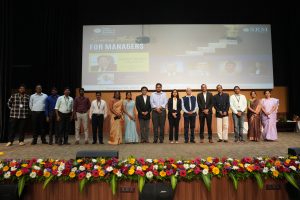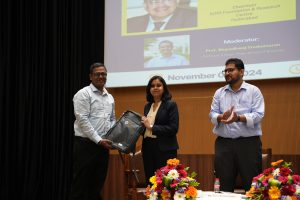Current Happenings
- Industry Experts Inspire Future Leaders at the 2nd Success Mantra for Managers November 9, 2024
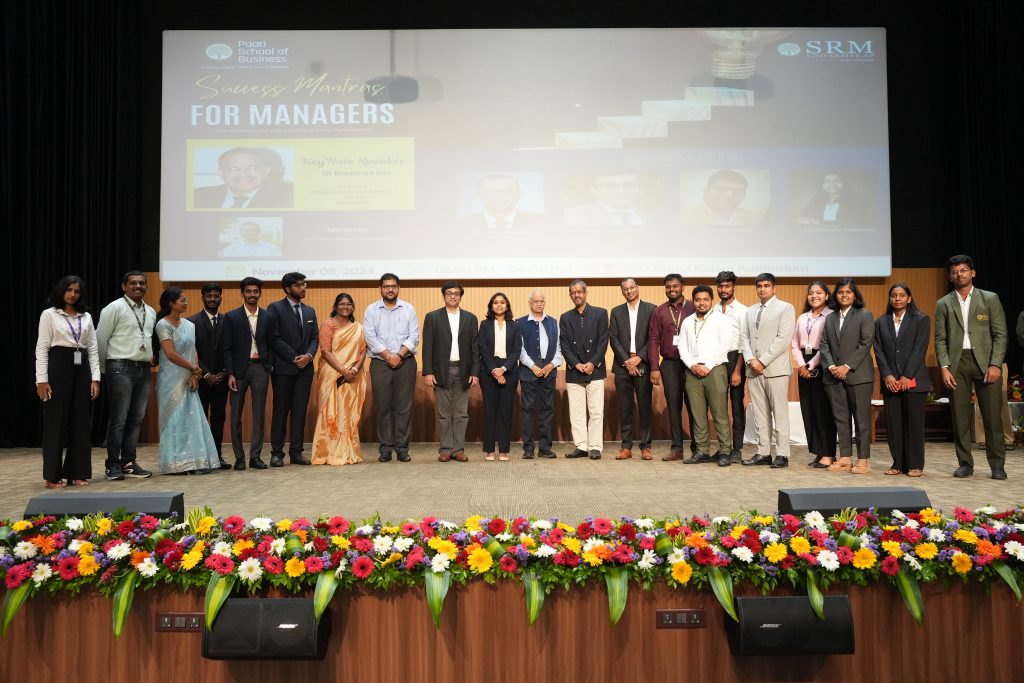
The Department of Management at the Paari School of Business conducted the second edition of its flagship event, “Success Mantra for Managers” (SMM), on November 08, 2024, uniting industry leaders to provide valuable insights, experiences, and professional guidance to students and faculty.
The event, moderated by Prof. Bharadwaj Sivakumar, Dean – Paari School of Business and Officiating Vice Chancellor, featured a distinguished panel that addressed the evolving landscape of management. Panellists shared their unique perspectives on effective leadership, motivation, and the importance of new-age skills in today’s corporate environment.
Ms Srimathi Sridharan, Director-BNY Mellon, remarked,” a manager’s role extends beyond mere target achievement; it fundamentally involves inspiring a team”. She highlighted the significance of kindness in leadership, drawing inspiration from her personal experience as well as the late industrialist and philanthropist, Mr Ratan Tata.
Mr Varun Gupta, Associate Director at PepsiCo, spoke passionately on the idea of Success. He stated, “Define Your Success, Yourself,” and stressed on the necessity for managers and leaders to possess a clear vision. He articulated how a well-defined personal and professional vision can guide managers in reaching their goals while empowering their teams.
Dr Bhujanga Rao, Chairman-KIMS Foundation & Research Centre and the key-note speaker for the discussion shared insightful reflections on his experience with Dr Abdul Kalam. He noted that compassion was a standout quality of Dr Kalam’s leadership, underlining that effective leadership encompasses understanding and supporting team members on both professional and personal levels.
Mr Suresh Ponnuru, Director-Analytics & Strategy Leader at Tiger Analytics, articulated the critical role of a leader in effectively communicating their team’s work to both superiors and clients. He highlighted the importance of perseverance and the ability to seize opportunities as they arise, which are essential traits for successful management.
Additionally, Mr Vinay Mantha, MD, Corporate & Investment Bank at J P Morgan Chase, conveyed that a manager should not only celebrate successes but also embrace failures as learning opportunities. This duality, he suggested, is fundamental to continuous growth and resilience in leadership.
In response to a question about handling success and failures at work, the panellists endorsed the significance of having an alternate plan—plan B if plan A fails. They collectively asserted that leaders must take responsibility for setbacks and implement corrective actions promptly.
The discussion further emphasised the need for managers to constantly evolve and acquire new skills, aligning with the event’s core theme that today’s managerial role must balance high performance with adaptability and empathy. Panellists shared personal anecdotes that underscored the joys and challenges of the profession.
The conversation delved into the relevance of emerging skills, such as artificial intelligence and the necessity for continuous learning, all deemed critical for future managers. Despite the focus on new-age competencies, the panellists unanimously vouched for the enduring value of traditional age-old skills like networking and ability to spot opportunities.
The event aimed at presenting the students with actionable insights and reinforced the vital importance of developing a versatile skill set in preparation for their careers, equipping them to thrive in a dynamic professional landscape.
Continue reading → - Environmental Sustainability in Corporate Business Firms of Ghana October 22, 2024
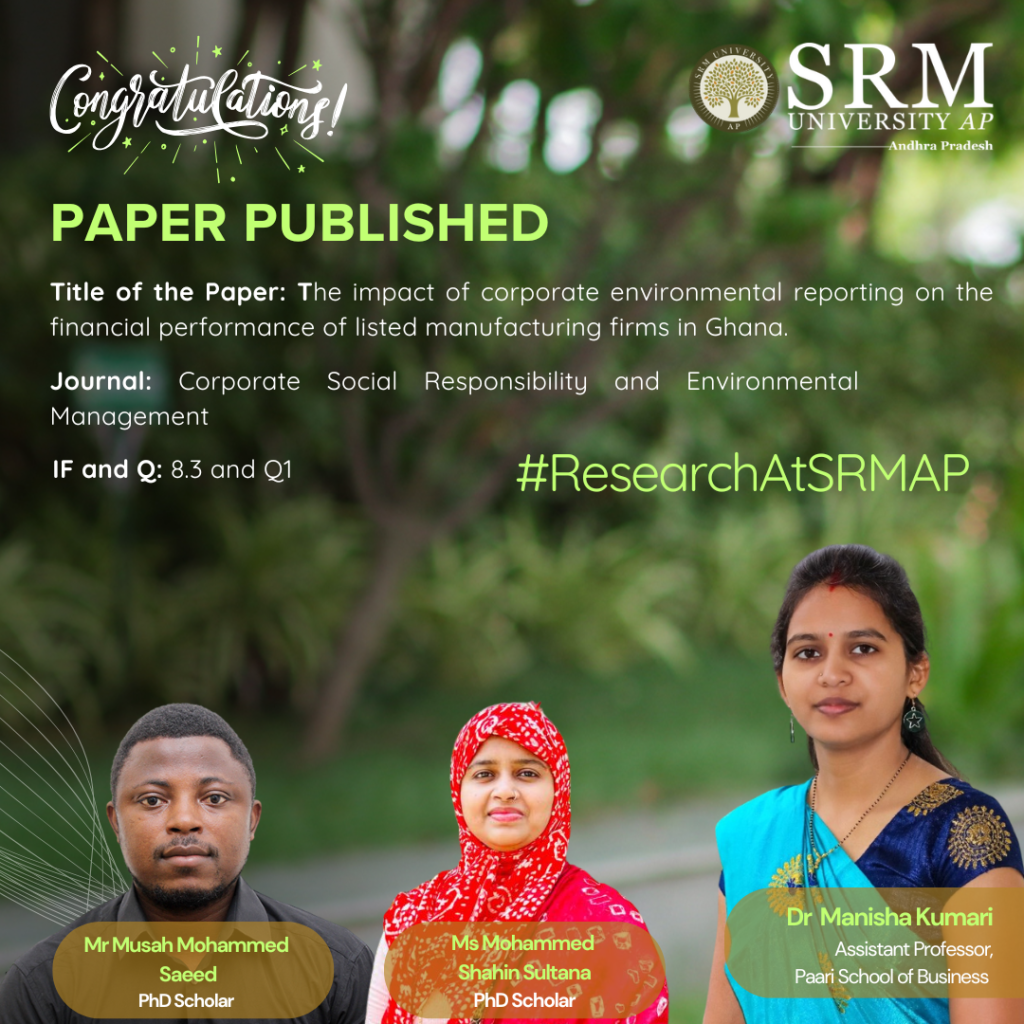
It is pivotal for multinational companies to opt for sustainable growth while expanding their domains. In this regard, Dr Manisha Kumari, Assistant Professor from the Department of Management, Paari School of Business, has published her paper titled “The Impact of Corporate Environmental Reporting on the Financial Performance of Listed Manufacturing in Ghana” along with her research scholars Mr Musah Mohammed Saeed and Ms Mohammed Shahin Sultana in the Q1 journal Corporate Social Responsibility and Environmental Management with the impact factor 8.3.
Abstract
A growing number of businesses are facing criticism for engaging in environmentally damaging practices. Despite advancements in technology and operational efficiency, the environmental challenges confronting businesses have become increasingly urgent. As disclosure requirements have expanded, the importance of reporting standards for environmental sustainability has risen. This study explores the impact of corporate environmental reporting on the financial performance of listed manufacturing firms in Ghana. It analyses ten years (2012-2021) of annual reports from 20 publicly traded manufacturing companies, using panel regression and content analysis to assess the data. The findings reveal that environmental sustainability disclosure (ENVD) has a positive and significant effect on return on equity (ROE) and net profit margin (NPM). Furthermore, disclosures related to health, safety, and community development initiatives have a strong positive impact on ROE. The study recommends that policymakers develop guidelines, especially for environmental reporting, to aid firms in preparing their annual reports. It also suggests that corporate accountants expand their expertise and collaborate with environmental and ecological experts. This research offers valuable insights for policymakers and provides a foundation for further investigation into the effects of corporate environmental reporting (CER) on the performance of listed firms in sub-Saharan Africa.
Explanation of the Research in Layperson’s Terms
In simple terms, this study looks at how companies are being criticised for harming the environment, even though they have access to better technology and more efficient ways of working. Environmental problems for businesses are getting more serious, and as governments and organisations require companies to share more information about how they affect the environment, the standards for reporting this information have become more important.
The research focuses on how reporting environmental activities affects the financial success of manufacturing companies in Ghana. It examines reports from 20 publicly traded companies over ten years (2012-2021). The analysis shows that companies that disclose their environmental efforts, such as how they manage health, safety, and community projects, tend to have better financial outcomes, particularly in terms of the profit they return to shareholders and how much profit they make overall.
The study recommends that governments create clear guidelines for environmental reporting to help companies include this information in their annual reports. It also suggests that accountants should work more closely with environmental experts to improve their knowledge. The research provides important information for policymakers and encourages further exploration into how reporting on environmental activities affects company performance in Africa.
Practical Implementation/Social Implications of the Research
The study shows that environmental sustainability disclosures (ENVD) positively impact net profit margin (NPM) and return on equity (ROE) but have minimal effect on return on assets (ROA). This emphasises the need for stricter regulations to ensure comprehensive sustainability reporting, with policymakers incentivising better practices to boost financial performance.
- Energy disclosure (END) positively affects NPM, ROA, and ROE, suggesting mandatory energy-efficiency reporting. Regulators should set standardised metrics and offer tax incentives to encourage energy-efficient technologies.
- Mandatory environmental reporting by companies can help achieve environmental goals, gain importance in securing trade partnerships, and attract global capital.
- Health and safety disclosures (HSD) improve financial metrics, underscoring the need for stricter workplace safety regulations and rewarding safety-focused companies to enhance both worker safety and financial outcomes.
- Community involvement disclosure (CID), which has a negative but insignificant effect on financial performance, highlights the need for standardised reporting and alignment with core business strategies to show long-term value.
- To boost transparency, integrated reporting should be adopted nationwide, embedding environmental and social disclosures into financial reports to better demonstrate their long-term impact. Strengthening Ghana’s weak regulatory framework and aligning it with international standards (e.g., IFRS S1 and S2) would improve corporate social responsibility (CSR) practices, particularly in community development.
- Fiscal incentives, such as tax breaks, could encourage firms to invest in long-term sustainability projects, such as education and healthcare. Capacity building within firms, including sustainability training, would improve both financial and environmental outcomes.
- Standard method of accounting for environmental reporting can bring consistency in the market. Also, they required a proper set of guidelines that can attract environmental investors.
Overall, policy reforms focused on transparency, regulation, and aligning sustainability with financial goals would significantly benefit Ghana’s corporate sector.
Future Research Plans
Dr Manisha plans to shift her focus from traditional accounting standards to the growing field of sustainability reporting. This transition aligns with the increasing global emphasis on environmental, social, and governance (ESG) issues, which have become central to corporate accountability and transparency. Sustainability reporting has been a topic of ongoing discussion, reflecting the need for businesses to disclose not only their financial performance but also their impact on the planet and society.
Continue reading →


